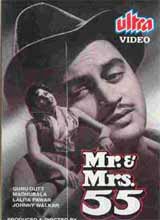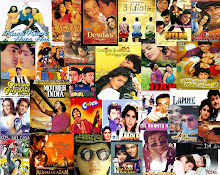This film is both a social commentary and a comedy. The opening scenes sets the stage for "Women's Liberation" versus "love and marriage." An unemployed cartoonist, Pritam (Guru Dutt), has an accidental meeting with a lovestruck, well-to-do girl and becomes infatuated. The girl, Anita (Madhabala), lives with her aunt, Seeta Devi (Lalita Pawar), who is a women's suffragette.
Anita's grandfather has died and left Anita his estate on the condition she marry. Because the aunt wishes Anita to have freedom from the ills of marriage, she seeks a groom willing to marry her niece on the conditions that he not see her after the marriage and that he divorce her soon after.
Pritam accepts the job offer without knowing the details. Once he learns the details, he refuses to be bought but when he finds out the girl he was to marry is Anita, he changes his mind and accepts the offer.
One of the funniest moments in the dialouge is when the aunt, who visits Pritam's humble abode, a rented room, asks, "Are you a communist" and Pritam replies, "No, a cartoonist." Pritam is a man content to live a simple life as long as he is free to live with dignity. He is not interested in material goods.
Meanwhile, Pritam and Anita meet on several occasions before the marriage. Anita is unaware Pritam is her intended groom. Affection grows between them. Early interactions between Pritam and Anita reflect a playful subtext regarding the battle of the sexes.

Anita does not find out Pritam is her future husband until they enter the Judge's chambers. After the civil ceremony, she turns her back on Pritam and refuses to speak to him because she feels he deceived her and is a greedy person.
Soon after Anita and Pritam marry, he gets a job. Unbeknownst to Anita, Pritam has not cashed any of the checks he received in payment for marrying her.
Soon the aunt demands that Pritam divorce Anita. Instead he "kidnaps" her and takes her on a long trip back to his family and his village. Along the way, he continues to try and charm Anita to convince her of his love.
Pritam acts the gentleman and Anita observes his family. In conversation with his sister-in-law, she sees a different side to marriage. The wife expresses a great sense of joy and cheerful duty in caring for her home, husband, and children. My only objection to the sentiments expressed was when Anita asks her if her husband beats her, the wife does not answer directly but says her husband gets angry if he finds his rice has not been perfectly cooked. To include occasional abuse as part of a "happy marriage" is inappropriate.
Anita has grown fond of Pritam but can not sort out her feelings because so many have manipulated the relationship. Her aunt comes to Pritam's village to retrieve Anita. In a burst of frustration with Pritam, Anita returns to her aunt's home. Pritam accepts his fate and stages a photographic session to make it appear he has engaged in dishonorable behaviors so Anita can get a divorce easily. He takes the photographs and the uncashed checks to the aunt. This is where the aunt shows her true colors. Rather than recognize that Pritam has committed a selfless act of love and that he is an honorable person, she pressures Anita to divorce Pritam using the photograph as evidence but does not tell her the source of the photograph or that Pritam returned the checks. Soon Anita learns from Pritam's friend that he staged the photograph and returned the checks.
Anita confronts her aunt with the truth -- and tells her to "go and gain real life experiences rather than giving lectures," because maybe many women are happy in their marriages.
Anita rushes to find Pritam who has made arrangements to fly to Mumbai. As you can guess, the two meet again and make-up.
While the film exaggerates stereotypical negative views of women's suffrage, men should not be rewarded for bad behavior by forcing women to stay with them. The flip side of "women's suffrage" are examples of men who divorce their wives of longstanding for younger wives. The ability to utilize the legal system to redress or remedy injustice or criminal behavior should be available to all.
Madhabala, Guru Dutt, and Johnny Walker provide fine performances. Madhabala's Anita is a bit pouty but she gives an energetic performance and looks wonderful in a black sari as it blows in the wind as she walks through Pritam's village at night. Guru Dutt, who also directed the film, cuts a fine figure and has a good sense of comedic expression as well as an understated expression of emotion. Johnny Walker as Pritam's sidekick is funny. Other secondary characters like the aunt's secretary and Walker's girlfriend also provide fine performances.
Shot in black and white, Guru Dutt made excellent use of shading. At times, the intense contrast added to the mood of various scenes.
Starring: Guru Dutt, Madhubala, Lalita Pawar, Johnny Walker, Yasmin, Kumkum
Screenplay and Dialogues: Abrar Alvi
Cinematography: V.K. Murthy
Lyrics: Majrooh Sultanpuri
Music: O.P. Nayyar
Produced and Directed by: Guru Dutt, 1955

No comments:
Post a Comment